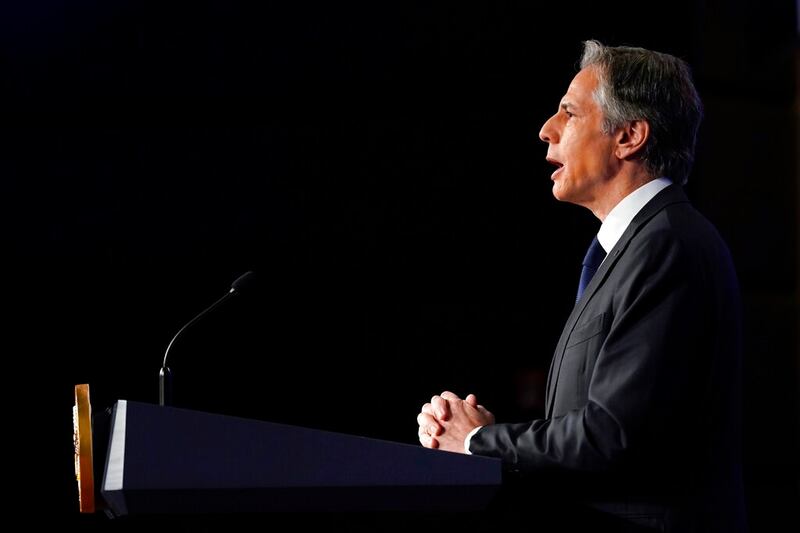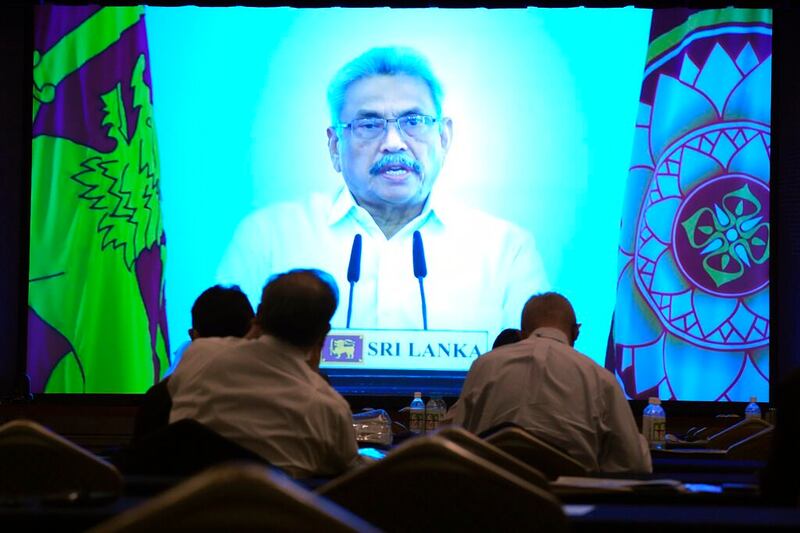Singapore’s prime minister warned Thursday that trade and security were being put at risk by U.S.-China tensions and urged better communication between Washington and Beijing to maintain stability and growth in Asia.
“If U.S.-China relations continue on this path, it will lead to further bifurcation of technology and splitting of supply chains or even worse, unintended consequences,” Prime Minister Lee Hsien Loong told an audience at the 27th Future of Asia conference in Tokyo.
His comments came hours before the top U.S. diplomat, Antony Blinken, made a speech in Washington where he accused China of seeking to reshape the international order. He also said that the U.S. is not looking for conflict or a new Cold War.
Lee, on a four-day working visit to Japan, delivered a keynote speech at the annual, two-day conference, organized by Nikkei Inc., where Asian political leaders and academics are discussing regional issues.
Lee’s sentiments were echoed by Malaysian Prime Minister Ismail Sabri Yaakob who said that “old divisions are deepening” because of the Ukrainian war and the U.S.-China tensions.
“Look at the U.S.-China trade war. These discriminatory tariffs and now real possibility of a divided supply chain have caused negative ripple effects throughout the world,” he said.
Singapore’s Lee called for adversaries to talk to each other.
He noted that even during the Cold War, there were channels of communication on many levels between the U.S. and Soviet Union leadership. He said that not only the U.S. and China, but countries that have disputes with each other should talk, too.

‘We aren’t looking for conflict’
The Southeast Asian leaders’ remarks came on the heels of U.S. President Joe Biden’s first visit to Asia since taking office in January 2021.
In Tokyo this week, Biden announced the launch of the Indo-Pacific Economic Framework for Prosperity (IPEF) which Singapore, together with 12 other nations, signed up to with hopes that it will lead to a free trade agreement in the future.
IPEF does not include China and has been criticized by Beijing as a U.S. tool “to coerce regional countries.”
Biden also attended a summit of the Quad, an Indo-Pacific security grouping that is widely seen as countering China’s rising influence and assertiveness in the region.
U.S. Secretary of State Blinken followed up on that strategic push with a China policy speech at George Washington University on Thursday, where he vowed that the U.S. would “defend and strengthen” international law, principles and institutions which he argued that China was undermining.
While critical of Beijing, Blinken said: “We aren’t looking for conflict or a new Cold War. To the contrary, we’re looking to avoid both.” He added that the U.S. “stands ready” to increase direct communication with Beijing.

Warning of an arms race
Prime Minister Lee urged that China be “integrated” into the region.
“Most countries would prefer not to be forced to choose between the U.S. and China,” he said.
While praising Washington for providing the framework for peace and stability in the region since the end of World War II, Lee said countries should acknowledge that China’s economic influence in Asia is large and growing and “it has benefitted the region immensely.”
“It’s far better that China’s economy be integrated into the region, than for it to operate on its own by a different set of rules,” he said.
The Singaporean leader said Asian countries have increasingly emphasized national security considerations over the economic gains from free trade and investment flows.
“If we only look at regional security from the perspectives of individual nations, we may end up with an arms race and an unstable outcome,” Lee warned.
He suggested that countries should work together for collective security and they must do it “beyond forming alliances and formal groupings of like-minded partners … but also through engagement and trust-building arrangements with potential adversaries.”
Food supply chain disruption
Participants in the Tokyo conference also highlighted the impact of the conflict in Ukraine. Malaysia’s Ismail Sabri said that current supply chain disruptions, including food, affect developing nations first.
Sri Lankan President Gotabaya Rajapaksa, who is facing mass protests and is accused of economic mismanagement, asked the international community for help. The indebted Indian Ocean island nation is struggling to import sufficient food and fuel to meet its needs.
In a pre-recorded message, Rajapaksa said that the last few months have been extremely difficult for his country.
"We are presently undergoing a severe economic crisis that has profoundly impacted the lives of all Sri Lankans resulting in social unrest," he said.
"We urgently require the assistance of our friends in the international community to ensure ... our immediate needs," the president said.
Rajapaksa said the shortages of food items and sharp increases in food prices likely to occur in the months ahead will place considerable strain on many countries.
A Chinese participant to the conference, former vice minister of commerce Yi Xiaozhun, went further, saying that if the Ukrainian conflict continues, it will escalate energy and food shortages worldwide, and “even trigger a global economic crisis of a scale no less than the 2008 international financial crisis.”
Yi, who also once served as China's envoy to the World Trade Organization, said as countries in Asia are largely dependent on trade, they would be affected the most when global trade declines in the post-pandemic era.
BenarNews journalist Subel Rai Bhandari in Bangkok contributed to this report.
